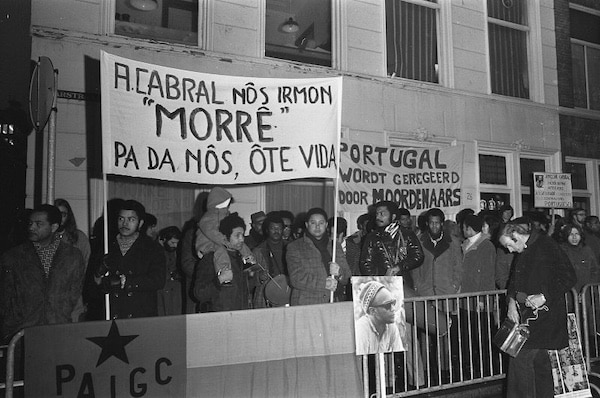For much of the twentieth century, Marx’s ideas inspired anti-colonialism and other movements for social justice worldwide. Although Marx did not theorise revolution in non-European contexts, the application of his methods by southern revolutionaries in various contexts led to the development of Global Marxism, an indigenised Marxism adapted to local contexts.
This indigenised Marxism has helped southern revolutionaries topple states and reorder social life after victorious revolutions or national liberation struggles. Alternatively, it has significantly influenced the political and intellectual history of countries in the global South. Yet, Marx has been repeatedly accused of Eurocentrism, and some have referred to Marxism as a white European model for social transformation and emancipation, which does not resonate with the majority world outside Europe and North America.
In Global Marxism: Decolonisation and Revolutionary Politics, I show that Marxism has never been Eurocentric. In the introduction, I demonstrate that Marx himself had a global outlook in his analysis and critique of the political economy. However, critiques fail to account for the scope of Marx’s work and tend to reduce him to a certain period, publication, or even a few lines of text. More importantly, they ignore global Marxism and its enduring influence on the global South.
In the main chapters of the book, I discuss nine revolutionary figures: Jawaharlal Nehru, Hồ Chi Minh, Mao Zedong, Kwame Nkrumah, Amílcar Cabral, Franz Fanon, Ernesto Che Guevara, Ali Shariati, and Subcomandante Marcos. These figures cover various regions of the Global South: Asia (China, India, and Vietnam), Africa (Algeria, Guinea-Bissau, Ghana), Latin America (Cuba and Mexico), and the Middle East (Iran).
I underline the place of Marxism in the accounts of these revolutionaries and the outstanding anti-colonial, anti-imperialist, and anti-capitalist struggles that swept across the global South in the twentieth century. I discuss various ways in which their engagement with Marxism helped them mobilise support and ultimately succeed in hard-fought struggles. I also show how and to what extent these figures contributed to Marxism. Their creative engagement not only localised and indigenised Marxism but also globalised it. Importantly, the impact of each revolutionary extends beyond a single country to a region, continent, and to the world.
Moreover, I have illustrated that despite local adaptations, Marxism has remained a coherent set of ideas as it developed historically and spread geographically. None of the figures failed to emphasize the importance of economic relations in underpinning structures of dominance, inequality, and exploitation. In each context, Marxism offered a methodology that enabled the revolutionaries to link the local and national to the global. Some of the figures focused on practical aspects of building socialism. A clear circulation of ideas and practices is apparent in global Marxism while internationalism has been its cornerstone.
There are unlimited examples of Marxism’s impact on the world and social struggles. Nevertheless, this book shows that a very substantial and continuous engagement with Marxism has come from the global South and by people involved in actual political struggles, who found in Marxism a powerful framework that helped understand and change the world. The task is up to us to engage with the ideas of these revolutionaries to determine their contemporary relevance as theoretical and practical blueprints of emancipation and liberation. Ultimately, the challenges of our times are not discontinuous from the pressures and hurdles faced by Nehru, Mao, and Guevara.
The issues addressed by the revolutionaries discussed in the book remain extremely relevant today: combating imperialism, inequality, poverty, hunger, violence, and injustice. Moreover, through their views and work emerged a noble vision for the future of different nations and regions, a vision that is still cherished by many and has laid the foundations on which present politics and struggle have acted. This point is very significant in that it addresses the most challenging question of our time: creating a viable alternative to capitalism. This does not mean that the works and ideas presented here can immediately provide an answer for an alternative vision, but they can inspire and energize those of us in search of an alternative vision.
The past two decades have seen an enormous number of mass protests around economic issues and, more recently, an escalation in labour disputes. Meanwhile, we have witnessed the rise of right-wing nationalist movements, which at times, in a terrifying manner, resemble fascism. In addition, the unprecedented climate crisis and its horrifying impact on humans and non-humans have made the limits and contradictions of global capitalism more apparent than ever. The violence in Palestine has convinced millions of people around the world that an urgent response is required. This unsettling conjuncture provides a possibility for the revival of Marxian thought and practice.
This book adds to the growing call to reconnect with Marxism as a framework for analysing global capitalism’s multiple crises and the prospects for revolutionary change, but also as the basis for reimagining a different world beyond capitalism.
Simin Fadaee is Senior Lecturer in Sociology at the University of Manchester and President of International Sociological Association Research Committee on Social Classes and Social Movements. To read more see: Simin Fadaee (2024) Global Marxism: Decolonisation and Revolutionary Politics. Manchester University Press.

